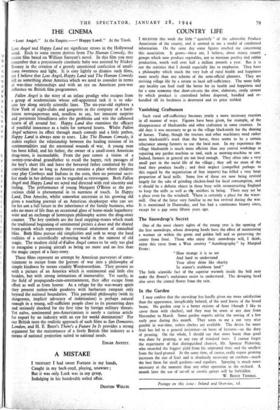COUNTRY LIFE I RECEIVED this week the little " quarterly
" of the admirable Produce Association of the county, and it seemed to me a model of condensed information. On the same day some figures reached me concerning this association. It grows—these are, I believe, about ninety county groups which now produce vegetables, not to mention poultry and rabbit production, worth well over half a million pounds a year. But it is not the statistics that I should especially like to emphasise. They have a philosophy which touch the very hub of rural health and happiness more nearly than any scheme of the semi-official planners. They are reviving village life by a return to local self-sufficiency. The more fully any locality can feed itself the better for its health and happiness and for a sane economy that short-circuits the slow, elaborate, costly system by which produce is centralised before dispersal, handled and re- handled till its freshness is destroyed and its price trebled.
Vanishing Craftsmen
Such rural self-sufficiency becomes yearly a more necessary reaction in all manner of ways. Figures have been given, for example, of the disappearance of blacksmiths and other craftsmen in some counties. In old days it was necessary to go to the village blacksmith for the shoeing of horses. Today, though the tractors and other machinery need rather more blacksmith's work than the horse, there seems to be a certain reluctance among farmers to use the local man. In my experience the village blacksmith is much more efficient than any central workshop in repairing any garden machine or tool, such as mowing-machine or saw. Indeed, farmers in general are not local enough. They often take a very small part in the social life of the village ; they sell no atom of the food they produce locally ; and their neglect (compelled perhaps in this regard by the organisation of free imports) has killed a very large proportion of local mills. Some few of these are now being revived largely for the sake of grinding chicken-food for local consumption, and it should be a definite object in those busy with reconstructing England to keep the mills as well as tlic smithies in being. There may yet be a place even for the windmill. 'There is certainly a place for the water- mill. One of the latter very familiar to me has revived during the war. It is mentioned in Domesday, and has had a continuous history since, except for a gap some fifteen years ago.
The Snowdrop's Secret One of the most cheery sights of the young year is the opening of the first snowdrops, whose drooping heads have the effect of maintaining a warmer air within the green and golden bell and so preserving the centre from frost. Those who enjoy their snowdrops will, I think, enjoy this verse from a West country " Autobiography " by Margiad Evans:
" How strange it is to see
And hard to understand
Your silver shine like charity In winter's stubborn land."
The little scientific fact of the superior warmth inside the bell may make the flower's endurance easier to understand.. The drooping head also saves the central flower from the rain.
In the Garden I may confess that the snowdrop has hardly given me more satisfaction than the appearance, inexplicably belated, of the seed leaves of the broad beans. No garden crop is a better resister of frost (though I like to cover them with cloches), and they may be sown at any date from November to March. Some garden experts advise the sowing of a few early peas during this month. They seem to me a not very wise gamble in war-time, unless cloches are available. The desire for more fruit has led to a general insistence—in hosts of lectures—on the duty of pruning. On the whole, I should say that more harm than good was done by pruning, at any rate of standard trees. I cannot forget the experiment of that distinguished chemist, Mr. Spencer Pickering, who recorded the biggest yield from his unpruned trees and the smallest from the hard-pruned. At the same time, of course, really expert pruning increases the size of fruit and is absolutely necessary on cordons—much the best form for small gardens—and espaliers. Spraying is much more necessary at the moment than any other operation in the orchard. A month later the use of tar-oil or caustic sprays will be forbidden.
W. BEACH THOMAS.
Postage on this issue : Inland and Overseas, rd.


























 Previous page
Previous page